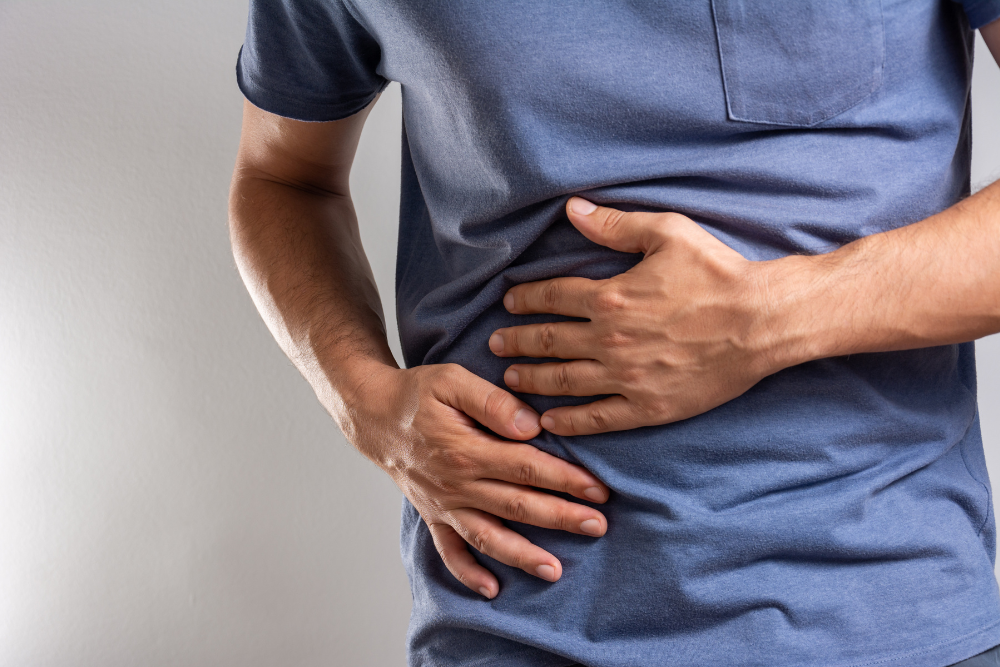Dealing with uncomfortable bloating during your college years? You're definitely not alone. Here's everything you need to know about managing digestive discomfort while juggling classes, social life, and limited budgets.

Table of contents
Why College Students Experience More Bloating
Picture this, You're rushing between classes, grabbing whatever's available at the dining hall, pulling all-nighters fueled by energy drinks and vending machine snacks. Sound familiar?
Nearly 65% of college students report regular digestive issues, with bloating being one of the most common complaints.
College life creates what gastroenterologists call "digestive perfect storm" conditions. The combination of irregular schedules, processed foods, and chronic stress fundamentally disrupts your gut's natural rhythm.
If this sounds familiar and you’re tired of dealing with constant bloating, take Claisen’s 2-minute Gut Quiz and get personalized solutions for fast relief.
The most common college bloating triggers include:
- Irregular Eating Patterns: Your digestive system thrives on routine, but college schedules make consistent meal timing nearly impossible. When you eat at 11 AM one day and 2 PM the next, your gut can't establish proper digestive rhythms.
- High-Sodium Dining Hall Foods: Most campus meals contain 2-3 times the recommended daily sodium intake. Excess sodium causes water retention and creates that uncomfortable "stuffed" feeling that many students mistake for normal fullness.
- Stress-Induced Digestive Changes: Academic pressure doesn't just affect your mind - it directly impacts your gut. Chronic stress alters gut bacteria composition and slows digestive motility, leading to gas buildup and bloating.
- Caffeine Overload: That third cup of coffee or energy drink might keep you awake, but it also stimulates excess stomach acid production and can speed up digestion too much, causing gas and discomfort.
There are separate blogs attached below on how to drink coffee and energy drinks without bloating.
The Science Behind College-Related Digestive Issues
Understanding why your gut rebels during college helps you address the root causes rather than just treating symptoms.
1- The Gut-Brain Connection in Academic Stress
Your digestive system contains more nerve cells than your spinal cord, which is why stress literally gives you "gut feelings." During high-stress periods like finals week, your body diverts energy away from digestion, slowing the process and allowing gas to build up.
Research published in the American Journal of Gastroenterology shows that students experience 40% more digestive symptoms during exam periods compared to regular academic weeks.
2- The Dining Hall Digestion Dilemma
Campus food services prioritize convenience and cost over digestive health. The result? Meals loaded with:
- Refined carbohydrates that feed gas-producing bacteria
- Artificial additives that can trigger sensitivity reactions
- High-fat content that slows gastric emptying
- Limited fiber variety that disrupts healthy gut bacteria balance

3- Sleep Deprivation's Impact
Those late-night study sessions do more than make you tired. Poor sleep directly affects the hormones that regulate digestion, including ghrelin and leptin, which control hunger and satiety signals.
Quick Relief Strategies for College Heartburn
When heartburn strikes between classes, you need fast, effective solutions that work within your dorm room limitations.
1- Immediate Gut Relief Techniques You Can Do Anywhere
The "Library Walk" Method: Even 5-10 minutes of gentle walking can stimulate the vagus nerve, which controls digestive function. If you're stuck in the library, try walking to different floors or taking a loop around the building every hour.
Abdominal Breathing Technique: This works anywhere - even during lectures. Place one hand on your chest, one on your belly. Breathe so only the bottom hand moves. Do this for 2-3 minutes to activate your parasympathetic nervous system and improve digestion.
The "Dorm Room Reset" sequence:
- Apply heat (heating pad, hot water bottle, or warm towel from the dryer)
- Gentle knee-to-chest stretches while lying down
- Child's pose or cat-cow stretches for 5 minutes
2- Strategic Hydration for Digestive Health
Most college students are chronically dehydrated, which can worsen heartburn by slowing down digestion. To stay hydrated without disrupting your digestive system, follow the 15-minute rule: take 3–4 sips of room-temperature water every 15 minutes throughout the day. Focus on drinking most of your water between meals rather than during them, as consuming large amounts of liquid while eating can dilute digestive enzymes and further slow digestion.
3- Dining Hall Foods to Prevent Bloating
Your dining hall might not offer gourmet options, but strategic choices can dramatically reduce heartburn episodes.
Green Light Foods (Choose These Often)
- Easily Digestible Proteins: Grilled chicken, baked fish, and eggs
- Simple Carbohydrates: White rice, plain pasta, and sourdough bread
- Cooked Vegetables: Steamed or roasted carrots, zucchini, and green beans
- Safe Fruits: Bananas, melons, and apples (not citrus)
Red Light Foods (Limit These)
- Fried and Greasy Foods: Pizza, french fries, and fried chicken
- Tomato-Based Dishes: Marinara sauce, pizza sauce, and salsa
- Spicy Foods: Hot sauce, jalapeños, and heavily seasoned dishes
- Citrus: Orange juice, lemonade, and citrus fruits
- Carbonated Beverages: Sodas and sparkling water
The "Dining Hall Strategy"
Start small: Begin meals with smaller portions. You can always go back for more, but overeating is one of the fastest routes to uncomfortable heartburn.
Eat slowly: Even when rushing between classes, take time to chew thoroughly. This reduces the amount of air you swallow and improves digestion.
Time your visits: If possible, eat during off-peak hours when food is fresher and you can take more time with your meal.
Tried every strategy but still struggling with Bloating? Take the Claisen Gut Quiz to uncover your unique triggers and get a personalised plan for fast, lasting relief.
4-Budget-Friendly Bloating Prevention
Let's be honest - managing bloating on a ramen noodle budget isn't easy. Quality heartburn-friendly foods often cost more than processed options, and students are already stretching every dollar. The good news? You don't need expensive supplements or organic everything to find real relief.
The secret lies in strategic spending on a few key items that provide maximum impact for your digestive health. Think of this as investing in your academic performance - when your stomach isn't on fire, you can actually focus on that chemistry exam.
Your $25 Bloating Survival Kit
- Generic antacids are your first line of defense. Skip the brand names - store-brand Tums work just as well for $3-5 versus $8-10 for the fancy packaging. Keep them everywhere: backpack, car, nightstand, and that emergency stash in your textbook.
- H2 blockers like generic Pepcid provide longer-lasting relief when you know trigger foods are coming. At $8-12 for a month's supply, they're cheaper than constantly popping antacids. Take one before that inevitable pizza night with friends.
- Herbal teas offer natural relief without side effects. Ginger tea reduces inflammation, while chamomile soothes irritated tissues. A box of tea bags costs $4-6 and lasts months - much cheaper than daily coffee shop visits that might trigger more heartburn.
- A small heating pad becomes invaluable during severe episodes, especially when heartburn disrupts sleep before exams. Look for compact versions around $15-20 that work in dorm rooms with limited outlets.
5- Managing Academic Stress and Bloating
Here's what most students don't realize: that burning sensation during finals week isn't just from bad dining hall pizza. Academic stress literally changes your stomach acid production, creating a vicious cycle where heartburn makes studying harder, which increases stress, which worsens heartburn.
Breaking this cycle requires specific strategies that work within crazy college schedules.
- The 5-breath reset works anywhere, even during lectures. When you feel stress building, take 5 slow, deep breaths before it triggers acid production. This simple technique activates your calm-and-digest nervous system response.
- Study break movement doesn't require a gym membership or special equipment. Walk to a different floor of the library every hour, do desk stretches between chapters, or take the long way to your next class. Movement helps process stress hormones before they impact your digestive system.
- The stress-eating trap becomes dangerous during high-pressure periods. When anxiety hits, we gravitate toward comfort foods that often trigger heartburn. Keep healthier stress-relief snacks available: bananas, plain crackers, or herbal tea instead of energy drinks and chips.
Key Takeaways
College life disrupts digestion with irregular schedules, processed foods, high stress, and poor sleep.
Smart dining hall choices like grilled proteins, plain carbs, and cooked veggies help prevent heartburn.
A $25 survival kit with antacids, H2 blockers, herbal teas, and a heating pad offers quick relief.
Follow the 3-2-1 rule: stop eating 3 hours before bed, finish drinks 2 hours before, and avoid screens 1 hour before sleep
Academic stress increases acid production; manage it with deep breathing, movement, and good sleep.
This article and its contents have been medically reviewed by Aditya Jain (MD at Harvard Medical School and Op-Ed Fellow at Doximity).
Can I still drink coffee if I have heartburn in college?
Yes, but with modifications. Choose coffee with milk or cream to buffer acidity, never drink it on an empty stomach, and limit to one cup daily. Cold brew coffee is naturally less acidic than hot-brewed varieties. If coffee consistently triggers symptoms, try green tea or herbal alternatives for caffeine.
What's the best late-night snack for college students with heartburn?
Plain crackers, bananas, or a small piece of toast work best for late-night studying. These foods are bland, easily digestible, and help absorb excess stomach acid. Avoid spicy, fatty, or acidic foods after 9 PM. Keep these heartburn-safe options in your dorm for emergency snacking.
Does stress really make college heartburn worse?
Absolutely. Academic stress increases stomach acid production by up to 40% and slows digestion, allowing acid to build up. Chronic stress also changes gut bacteria composition and makes your digestive system more sensitive to trigger foods. Managing stress through breathing exercises, regular sleep, and campus counseling services directly improves heartburn symptoms.
How can I manage heartburn during finals week?
Establish consistent meal timing one week before exams, pack heartburn-safe snacks for long study sessions, avoid energy drinks and excessive caffeine, take movement breaks every 2 hours, and maintain the 3-2-1 evening rule despite schedule pressures. Keep antacids easily accessible and prioritize sleep quality over extra study hours.










